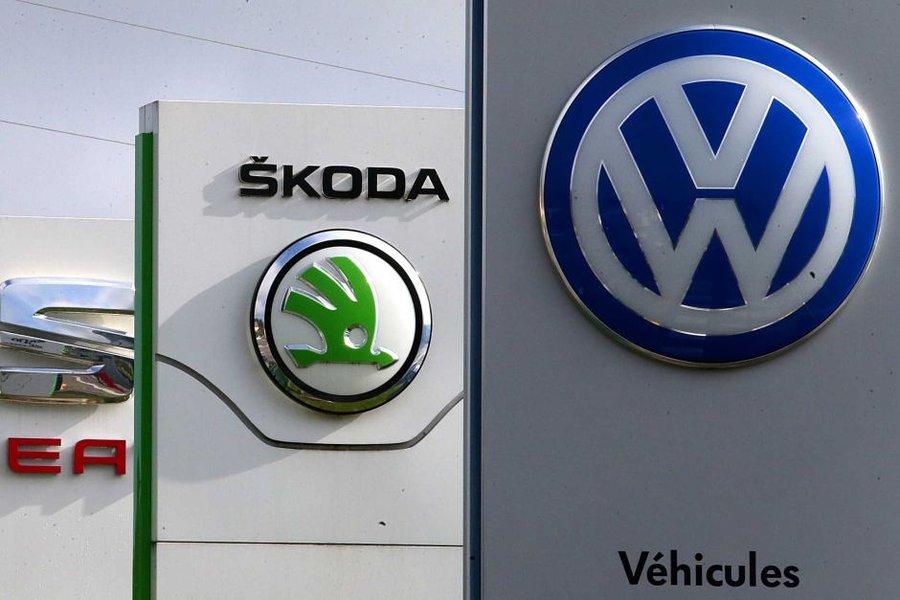As VW struggles to cut jobs and spending at German factories and turn the page on dieselgate, Skoda's superior car reviews and profitability have intensified the brands' rivalry within the Volkswagen empire.
VW now wants to reduce what it sees as Skoda's unfair advantages - combining German technology with cheaper labor - and reaffirm the top-selling brand's primacy ahead of a wave of new electric car launches, the sources said.
The tussle between VW and Skoda is reviving tensions at the heart of the Volkswagen group between profits and jobs, and between central control and autonomy for its 12 vehicle brands.
"Instead of devoting our efforts to beating Tesla, we may just be setting up a futile internal conflict," said one manager.
Once the butt of jokes, Skoda has blossomed under 26 years of VW group ownership into a successful mid-market carmaker, steadily winning business from rivals - including VW - and surpassing even Audi's operating profit margin last year.
At the same time, VW is facing thousands of job cuts as management moves to trim excess capacity at German factories. Its powerful domestic unions see Skoda's success as both a threat and a potential lifeline.
VW workers' representatives are now demanding the transfer of some Skoda production to their underused German plants, a source close to the supervisory board told Reuters. The proposal aims to offset declining output of the VW Passat and aging Golf that could otherwise threaten more jobs.
They are also making the case that Skoda should pay higher royalties to use VW's main common vehicle platform. The so-called MQB architecture also underpins mid-sized models from the group's Audi and SEAT brands.
Responding to the news, Czech Prime Minister Bohuslav Sobotka said he would meet Skoda management and unions to ask for clarification.
The government will seek to ensure that VW investment plans are followed through and that "production is not moved outside the country," a statement released by Sobotka's office said.
Skoda's main union warned that a production shift could cost as many as 2,000 jobs. VW's works council declined to comment.
VW brand Chief Executive Herbert Diess is leading a parallel management effort to shield future VW models from direct competition with cheaper Skodas.
At a recent group executive committee meeting, Diess called for greater differentiation between VW and Skoda target markets and clientele, particularly for future electric models, three managers with knowledge of the matter said.
"The future positioning of brands is being looked at, but discussions are still ongoing," a VW group spokesman said, declining further comment.
Tension is expected to rise ahead of a Nov. 17 supervisory board session due to approve annual investment budgets across the world's biggest carmaker.
LABOR ADVANTAGE
Skoda's operating profit more than doubled over three years to 1.2 billion euros ($1.4 billion) in 2016, lifting its profit margin to 8.7 percent - second only to Porsche within the Volkswagen stable.
The VW brand, whose margin dipped to 1.8 percent after earnings fell by a third, still outsells Skoda globally but is growing more slowly in Europe.
Skoda's healthy profits partly reflect the shared car platform's economies of scale. Designed by VW engineers in Germany, MQB has been rolled out progressively since 2012.
But Skoda gets a further boost from cheaper labor. Manufacturing wages average 10.10 euros per hour in the Czech Republic, where most of its European cars are assembled, compared with 38.70 euros in German industry, according to Berlin's official statistics office.
How VW group CEO Matthias Mueller might resolve the dispute remains unclear. The clout of the German unions, which hold half of the company's 20 board seats, means Skoda's success may be viewed more as a problem than a model to emulate.
The German state of Lower Saxony, which occupies another two board seats, is also preoccupied with preserving VW jobs.
Unease at VW's Wolfsburg headquarters has been compounded by car reviews in which its models have sometimes lost face to cheaper Skoda cousins sharing the MQB platform.
The new Skoda Kodiaq sports-utility vehicle (SUV) is priced 1,500 euros ($1,765) below the VW Tiguan yet trumped the German brand in a quality survey by Auto Motor und Sport magazine. Skoda's Superb also drew favorable comparisons with the Passat.
Skoda denies any deliberate encroachment on VW's turf.
"We mainly attract customers from outside the VW group and that is also our mission," brand CEO Bernhard Maier told Reuters in a interview.
ELECTRIC FUTURE
Competition for resources among VW brands is nothing new. Unions lobbied for VW to lead development of emerging-market cars, but Skoda was allowed to take charge.
Now the group's 20 billion euro push to launch 50 electric cars by 2025 has brought tensions to a head as VW managers fear their battery-powered models may also be undercut, people with knowledge of the discussions said.
"The electric vehicle market is a new ball game where you cannot simply maintain the brands' positioning," said one. "Customers need to see that you are making changes."
VW and Skoda both plan to introduce coupe-styled electric SUVs in 2020 boasting the same 500 km (300 mile) range.
Any renegotiation of platform cost-sharing could also affect each brand's contribution to the new MEB platform being developed for electric cars.
In public, however, VW has played down the rivalry. With a combined lineup approaching 100 vehicles, brand CEO Diess said, there is always some risk of stepping on toes.
"There will always be some substitution," he told Reuters. "But some internal competition is also helpful." ($1 = 0.8491 euros)
Reporting by Andreas Cremer; Additional reporting by Jan Lopatka in Prague; Writing by Laurence Frost; Editing by David Clarke

